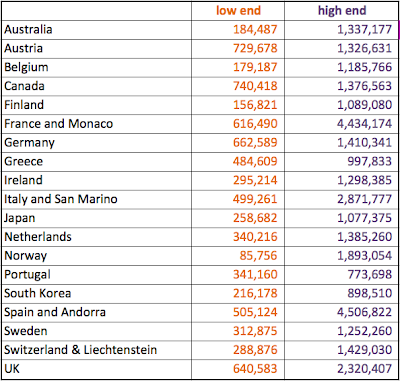Lee Sheppard has an update in Tax Notes [
gated] on the US "anti-inversion" rules--designed to treat corporations that in effect expatriate by reincorporating offshore--as if they were still US persons in some cases.
Reporting on a recent meeting hosted by the International Tax Institute on "
Corporate Inversions - Will They Ever End? Is There A Solution?," and featuring John Merrick (Special Counsel to the Associate Chief Counsel (International)); Lew Steinberg (Managing Director - Head of Strategic Advisory, Credit Suisse Securities (USA) LLC); and Willard Taylor (Adjunct Professor, NYU Law School), Lee says the consensus is that:
The anti-inversion statute, section 7874, doesn't work very well at its stated goals, and Congress hasn't bothered to fix section 163(j), the ineffectual interest-stripping rule. And there's not a whole lot the IRS can do about it, except treat the departed corporations the same way it treats real foreign parents.
For the uninitiated, in an inversion a U.S.-based multinational company restructures its corporate group so that after the transaction the ultimate parent is foreign. After this flip, shareholders of the former U.S. parent company now hold stock of the foreign parent company. Everything else stays the same, e.g. business as usual at the operations level.
Here is a nice explanation from Mayer Brown.
This kind of expatriation is susceptible to a charge of being done for tax dodging purposes only, and
Congress doesn't like it. Accordingly Congress enacted
7874 to throw various obstacles in the way of inversion and, most drastically, to ignore the expatriating attempt all together--i.e., to treat the foreign parent company as a US person--if U.S. shareholders retain 80% ownership. Lee says:
[N]o one is silly enough to allow them to retain more than 80 percent, in which case the surviving corporation would be re-domesticated. So most recent deals fall in the 75 percent range of retained U.S. ownership, Steinberg explained.
...In June 2012 the IRS issued new proposed ... and temporary regulations... [which] require that the expatriated corporation have at least 25 percent assets, employees, and income in its new country of residence. Merrick admitted that the 25 percent threshold is "a bit on the high side" and "inflexible." The IRS is open to constructive comments but will not return to the easier tests of the 2006 proposed regulations, he said.
Lee asks, "Is the third try a charm?" She says practitioners complain that "no company can possibly meet the 25 percent test, particularly the income/sales factor," but:
Merrick demurred. The statute is not designed to allow each U.S. multinational to flee to some other country, he explained. "Our view is that it requires a concentrated center of gravity," he said.
Interesting remark: a concentrated center of gravity seems like a
qualitative, rather than
quantitative, measure, more akin to a mind/management standard for corporate residence than the formalistic place of incorporation rule the US currently uses. Perhaps in time the US will adopt the mind & management rule either in addition to or to replace the current regime. If mind & management plays a replacement role instead of a supplementary one, that opens the door for also considering what individual residence looks like if one employs "a concentrated center of gravity"as the organizing principle. It seems that looks a lot more like the residency tests used by 99% of the rest of the world's countries.
Leaving aside the concentrated center of gravity remark, the 25% test itself is an interesting turn toward formulary apportionment. There has been a lot of discussion in international circles about whether the current standard for allocating revenues among countries based on the arm's length transfer pricing standard, which involves a lot of shenanigans, could be profitably replaced with a more formulaic approach to revenue sharing. As the
two papers I linked to yesterday suggest, under formulary apportionment countries would look to assets, employees and sales revenues to devise a formula for allocation among countries. The OECD has in effect rejected even the discussion of formulary apportionment as a policy matter, but
I have suggested that I do not think they can suppress this discussion much longer. If we have the US looking at these factors of income production for purposes of determining corporate residence, can formulary apportionment really be so far off the horizon?
Finally, noting that the ownership fraction seems to be the only factor the IRS wishes to consider in analyzing inversions at the moment, Lee states that the priority guidance in this area involves "regulations addressing
dilution of shareholdings and manipulation of the ownership fraction. Future regulations will
disregard certain shares of the new foreign corporation in determining the U.S. ownership fraction. The government had become aware of transactions designed to minimize U.S. ownership, such as issuance of 21 percent of the new foreign corporation to a friendly investor."
The obvious goal here is to continue to make it harder for US corporations to expatriate, on the theory that expatriation is highly suspect because tax avoidance is a main reason (and some believe the only reason) why a corporation would want to leave the US. This, I think, is consistent with the current US view toward expatriating individuals: their motives are also highly suspect, and so their exit may only be accomplished by means of complex and expensive administrative mechanisms. In the case of individuals, however, expatriation is a final act--once given up, US citizenship will be almost impossible to reacquire. Not so for corporations, at least, so far.


